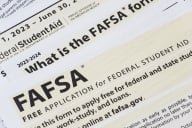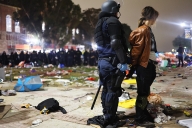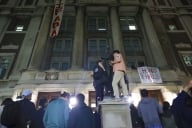You have /5 articles left.
Sign up for a free account or log in.
In October, a Williams College student group that had invited to campus Suzanne Venker, known for her antifeminist views, rescinded the invitation, amid much criticism that it had been extended in the first place. At the time, Williams administrators took pains to note that students made the decision and the college had not blocked her from appearing.
Adam Falk, the president at Williams, wrote an essay in the student newspaper calling on students to look for ways to engage with those with whom they disagree, but not to block their ideas from being heard. Falk wrote that the rescinded invitation "drew a torrent of public criticism for what was perceived widely as an unwillingness of our community to tolerate the expression of differing viewpoints."
Now Williams is facing another torrent (and some praise) because Falk blocked a speaking appearance scheduled for today by John Derbyshire, whose writings have been called racist and homophobic, among other things.
"Today I am taking the extraordinary step of canceling a speech by John Derbyshire, who was to have presented his views here on Monday night. The college didn’t invite Derbyshire, but I have made it clear to the students who did that the college will not provide a platform for him," Falk wrote in an email message to the campus.
"Free speech is a value I hold in extremely high regard. The college has a very long history of encouraging the expression of a range of viewpoints and giving voice to widely differing opinions. We have said we wouldn’t cancel speakers or prevent the expression of views except in the most extreme circumstances. In other words: there’s a line somewhere, but in our history of hosting events and speeches of all kinds, we hadn’t yet found it," Falk added. "We’ve found the line. Derbyshire, in my opinion, is on the other side of it. Many of his expressions clearly constitute hate speech, and we will not promote such speech on this campus or in our community."
Falk is not the first person to decide that Derbyshire crosses a line.
In 2012, he was fired by National Review, a conservative publication that is not shy about publishing articles that would be called politically incorrect for their views on issues such as race and gender. The magazine fired Derbyshire after he published an article called "The Talk: Nonblack Version," which was presented as a response to "the talk" many black parents have with their sons about what might happen in police encounters. In Derbyshire's version, he suggested that nonblack people might want to warn their children about black people. His essay questioned the intelligence of black people and suggested that there are reasons for others to fear black people.
The National Review statement on ending ties to Derbyshire said that the column "lurches from the politically incorrect to the nasty and indefensible. We never would have published it, but the main reason that people noticed it is that it is by a National Review writer. Derb is effectively using our name to get more oxygen for views with which we’d never associate ourselves otherwise. So there has to be a parting of the ways."
The Derbyshire speech at Williams was to have been part of "Uncomfortable Learning," a series in which some alumni pay for a student group to bring to campus speakers whose views might not otherwise be on campus. The canceled speech by a critic of feminism was also to have been part of the series. Williams as a college hasn't financed the events but has let the group use campus space for its events. Some students have protested various speakers and said that they shouldn't be brought to Williams.
On the Williams College Facebook page, some comments object to any move that blocks free speech, while others say that Derbyshire is indeed a rare case of someone who should not appear on campus.
Some on social media have argued that this case isn't just about a "controversial speaker."
Derbyshire did not respond to an email request for comment.
Several groups that are committed to free speech on campus are criticizing Williams.
On the blog of the American Association of University Professors, Henry Reichman, chair of the AAUP Committee A on Academic Freedom and Tenure, wrote, "Of course, Derbyshire’s views are despicable; if I were at Williams and he spoke I might well join a protest outside the speech, or walk out at an appropriate moment. But that’s not the issue. Falk’s decision violates the free speech rights of all potential speakers and, most importantly, it paternalistically denies to students the right to hear controversial views and to determine for themselves what they think."
Commentary on the Williams decision from the Foundation for Individual Rights in Education noted that many colleges have speakers visit whose views are disputed vehemently by many on campus.
"For the moment, it appears Williams has chosen a different path -- a path on which paternalistic administrators decide which ideas are too dangerous for college students to hear, even when students themselves have established a program specifically for the purpose of engaging with such ideas," said the FIRE post. "It is now up to the students, faculty, alumni and trustees of Williams to decide whether that is truly the kind of place they want their college to be, or whether they are going to push back against this act of censorship."








